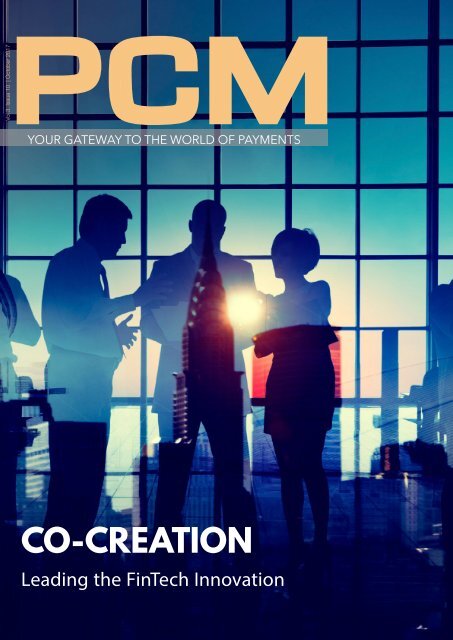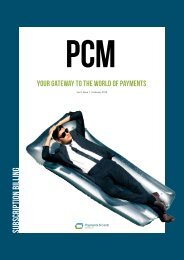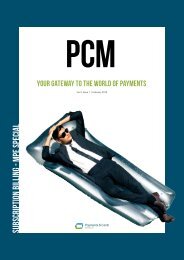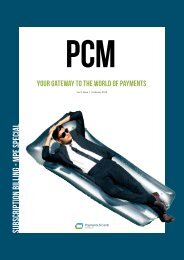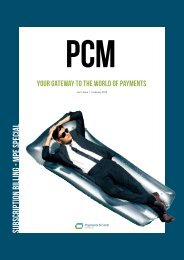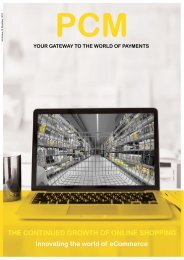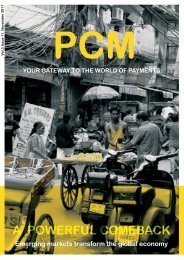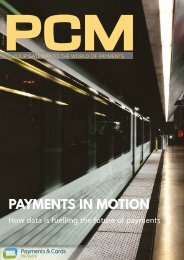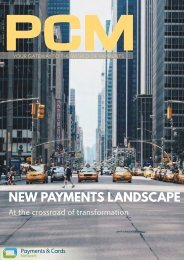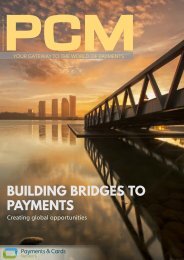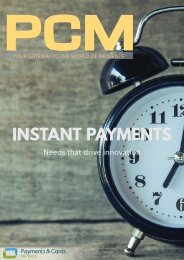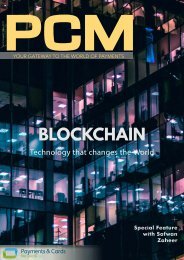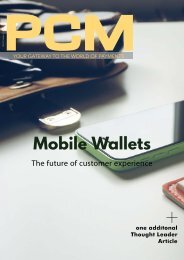PCM vol. 3 issue 10
In this issue we discuss all things co-creation in payments & FinTech. What is co-creation, how does it work and why is it so important for the future of FinTech? Expert opinion and interviews from Elavon, TruRating, Funderbeam, IBM, FinTech Atlanta and PayU
In this issue we discuss all things co-creation in payments & FinTech. What is co-creation, how does it work and why is it so important for the future of FinTech? Expert opinion and interviews from Elavon, TruRating, Funderbeam, IBM, FinTech Atlanta and PayU
Create successful ePaper yourself
Turn your PDF publications into a flip-book with our unique Google optimized e-Paper software.
Vol 3. Issue <strong>10</strong> | October 2017<br />
YOUR GATEWAY TO THE WORLD OF PAYMENTS<br />
CO-CREATION<br />
Leading the FinTech Innovation
ACADEMY<br />
EXPAND YOUR<br />
FINTECH KNOWLEDGE<br />
FOR A BETTER UNDSTANDING OF THE FINTECH WORLD<br />
SIGN UP NOW<br />
academy.teampcn.comwww.payment.jobs
Contents<br />
STORIES<br />
Amir Abdin<br />
Founder & Editor-in-Chief<br />
4<br />
7<br />
Brick-and-Mortar Suffers from a Pace Problem and<br />
the Payments Industry Can Help Fix it<br />
Tackling the challenges of cross-border payments<br />
amir@teampcn.com<br />
https://nl.linkedin.com/in/amir-abdin-21365683<br />
9<br />
The FinTech University<br />
11<br />
The Power of Co-creation in Payments<br />
14<br />
17<br />
21<br />
Funderbeam: the world’s first “start-up stock exchange”–<br />
built on blockchain<br />
Payment Collective - The story of a Merchant<br />
with bol.com<br />
Elavon’s Jamie Walker<br />
Blanka Ligeti<br />
Production Editor & Head of Creative<br />
blanka@teampcn.com<br />
https://www.linkedin.com/in/blanka-ligeti-7127289b/<br />
25<br />
26<br />
Hot Jobs<br />
Events<br />
THANKS TO OUR PARTNERS!<br />
<strong>PCM</strong> is designed by Blanka Ligeti, Payments & Cards<br />
Network. Art and photos © Payments & Cards<br />
Network, picjumbo.com, Flickr.com and Shutterstock.<br />
com, excluding advertisments and company logos.<br />
<strong>PCM</strong> is property of Payments & Cards Network, Herengracht<br />
576, 2nd Fl., <strong>10</strong>17 CJ, Amsterdam, The Netherlands.<br />
All material contained within <strong>PCM</strong> is the property of<br />
Payments & Cards Network. All other product and service<br />
names may be trademarks of their respective companies.<br />
©2017 Payments & Cards Network. All rights reserved.<br />
Reproduction of any kind is strictly prohibited without<br />
express prior written consent of Payments & Cards Network.<br />
ADVERTISING INFORMATION<br />
For details, please contact amir@teampcn.com<br />
3
THOUGHT LEADERS CORNER<br />
Brick-and-Mortar Suffers from a Pace Problem and<br />
the Payments Industry Can Help Fix it<br />
“<br />
by Georgina Nelson<br />
The speed of innovation can be dizzying. Just outside my office<br />
window, I can hear the noise of jackhammers as construction<br />
workers raise a new building. Retail has changed as much as<br />
my scenery, but there are also times when it feels as though<br />
innovation isn’t happening as fast as it could or that there is<br />
a reluctance to make changes due to lack of data or enough<br />
insight to make informed decisions.<br />
While ecommerce, with the enviable ability to A/B test<br />
continually, is on a path of near constant innovation, brickand-mortar<br />
stores have been slower to adopt, and adapt with,<br />
technology. Much of this can be attributed to differences in<br />
culture: online lives in a world where product innovations<br />
and iterations happen constantly and a competitor is always<br />
waiting in the wings to pounce on your customers.<br />
For these reasons, online is also much more collaborative and<br />
co-creative. The more value they can drive for their customer,<br />
the better - and if that means being open source or opening<br />
their API so that the industry can drive that value-add to their<br />
customers, that’s what they’ll often do.<br />
like a great idea, but until recently has simply not been done,<br />
making it much more difficult for retailers to adopt and<br />
integrate the innovative technologies needed to keep up with<br />
their own online businesses and those of their competitors.<br />
Simply put, they have a pace problem. The good news? The<br />
payments industry is well-positioned to fix it. There is a huge<br />
potential for POS companies to co-create with tech companies<br />
in the retail space by opening up their APIs to allow them to<br />
develop applications that sit on the terminal--like an app store<br />
for the terminal.<br />
A merchant could go into an app store and self discover:<br />
business applications, such as time and attendance, accounting<br />
software etc. Doing this would enable technology adoption<br />
to happen so much faster and make it much easier for brickand-mortar<br />
to compete with online.Thankfully, some payment<br />
companies see this potential. Verifone, Ingenico, Aevi, Poynt<br />
and Clover are good examples – new smart terminal designs<br />
are ripe to deliver these applications to the retailer and have<br />
already started offering a limited number of applications<br />
through its marketplace. Many of these applications are<br />
critical, not nice to haves.<br />
But to get there, the industry must be prepared to open up its<br />
hood and be more co-creative and collaborative.<br />
“<br />
Which is one of the reasons why online retailers have so many<br />
more tools at their disposal. Ecommerce platforms, such as<br />
Magento, facilitate the creation of new tools by having an<br />
open API that allows tech providers to build products on top of<br />
their platform, speeding delivering of new products to online<br />
retailers. They further compress adoption through their<br />
marketplace, where one can literally choose from nearly 2,000<br />
applications from marketing to payments to CRM.<br />
But it’s much more difficult for brick-and-mortar retailers to<br />
implement new technology at an equal pace. Part of the <strong>issue</strong><br />
is that the technology hub for these stores to gather data on<br />
customers is at the point-of-sale (card present) and the POS<br />
is traditionally a closed ecosystem. Thus, the ability to make<br />
value-added services available to the retailer at the POS sounds<br />
Homebase for example streamlines an antiquated method<br />
of employee scheduling, which many stores still track in a<br />
notebook. The Clover Marketplace features 250 applications,<br />
free and paid, from both Clover and outside developers that<br />
automate almost everything for the retailer.<br />
At TruRating, we have some amazing partners in the payments<br />
space, and we’re lucky enough (with a lot of sweat) to now be<br />
working with around 80-90 percent of the payment platforms<br />
- including marketplace providers - in our markets. It hasn’t<br />
always been an easy journey and we’re all learning along the<br />
way, but times are definitely changing - I’ve been to so many<br />
great events recently where the innovators and leaders of this<br />
sector are really building an exciting future. One that we’re<br />
delighted to be a part of.<br />
4
THOUGHT LEADERS CORNER<br />
I firmly believe that this is just the beginning. Simply put, brick-and-mortar stores must leverage technology to remain competitive,<br />
while the POS has incredible potential to be the hub for tech adoption. But to get there, the industry must be prepared to open up<br />
its hood and be more co-creative and collaborative. By making their APIs available more readily to outside developers, they can<br />
eliminate the unfair advantage of pace that is eluding the industry.<br />
About Tru Rating<br />
TruRating is on a mission to bring the truth back to<br />
customer ratings. Its innovative feedback solution,<br />
at the point of payment, enables businesses to<br />
simply and easily track consumer sentiment and<br />
crucially link it to spend, thereby understanding<br />
the customer experience at an unprecedented level.<br />
Working with the biggest payment companies in<br />
the world, TruRating has already collected over 6<br />
million ratings for its customers, which range from<br />
the largest global retailers to local restaurants and<br />
bookshops.<br />
TruRating was recognized by Gartner as a 2016 Cool<br />
Vendor and has offices in Australia, Canada, the U.K<br />
and the United States. For more information about<br />
TruRating, go to www.trurating.com.<br />
Georgina Nelson<br />
Founder and CEO at TruRating<br />
Georgina began her career as a leveraged finance lawyer<br />
at Clifford Chance. Georgina then joined Europe’s largest<br />
consumers’ association, Which? where she was responsible<br />
for advising the EU and the UK government on their<br />
technology strategy, as well as advising internal teams<br />
on their online propositions. It was in this role where she<br />
identified a market need for mass, representative, reliable<br />
consumer ratings.<br />
She saw how this need could not only serve to improve<br />
the world of business but also be valuable to consumers<br />
alike. With this vision, she set about realizing the huge<br />
potential of TruRating by bringing together a wonderful<br />
team, exciting customers and partners in the payments<br />
industry with the ultimate objective to bring the truth<br />
back to ratings.<br />
5
MAXIMIZE<br />
YOUR DATA<br />
VALUE<br />
THE LEADING SOURCE FOR DATA SCIENTISTS IN PAYMENTS<br />
CONTACT US NOW<br />
Having data dilemmas? Please contact: simon@digitalsource.io<br />
Digital Source | Herengracht 576 | <strong>10</strong>17 CJ | Amsterdam | The Netherlands | +31 (0) 202 373 639
THOUGHT LEADERS CORNER<br />
Tackling the challenges of<br />
cross-border payments<br />
By Matthias Setzer<br />
Following the development and uptake of mCommerce,<br />
cross-border now represents one of the biggest business<br />
opportunities available to merchants around the globe. Indeed,<br />
recent estimates have the cross-border market growing from<br />
$402 billion in 2016 to $994 billion in 2020, with nearly two<br />
thirds of cross-border business coming from high growth<br />
markets. With high growth markets also accounting for 85%<br />
of the world’s population, it’s no wonder ambitious merchants<br />
are increasingly attracted to the business opportunities this<br />
presents.<br />
However, in an ever-changing landscape, the payments<br />
ecosystem, historically burdened by complicated infrastructure<br />
and out-of-date processes, is one of the biggest hindrances to<br />
realizing the potential of cross-border e-commerce.<br />
With this in mind, interoperability and open platforms are<br />
arguably critical to help break down the barriers that exist for<br />
the fintech companies, financial institutions and businesses<br />
that are trying to reach a wider audience and increasingly<br />
operate internationally.<br />
We’re already seeing European regulators attempting to<br />
tackle these <strong>issue</strong>s with the scheduled implementation of the<br />
Payment Services Directive 2 (PSD2) in 2018.<br />
It is worth noting that the challenges of cross-border<br />
payments go beyond the complexities of legacy infrastructure<br />
and processes. Undeniably, the global rise in smartphones<br />
has fuelled the demand for cross-border trade. And as more<br />
consumers start to purchase goods online, convenience is<br />
becoming a priority.<br />
Although we are seeing payments technology continue to<br />
e<strong>vol</strong>ve at an unprecedented pace and payment providers<br />
looking to increase convenience and security for the consumer,<br />
it is crucial to recognise that the consumer is also e<strong>vol</strong>ving,<br />
both in terms of behaviour and attitudes.<br />
For example, customers now take for granted that frictionless<br />
payments are technically possible and they now fully expect<br />
the market to cater to their demand to purchase from<br />
whomever they want, whenever they want. In short: the better<br />
the experience on offer, the quicker consumer uptake will be.<br />
Unfortunately, cross-border trade has not yet caught up<br />
to this customer expectation. In addition, as cross-border<br />
eCommerce grows, consumers expect to be able to pay for<br />
products through local payment methods that are familiar to<br />
them. Alternative payment methods currently account for 59%<br />
of transactions across the globe, so offering a wider variety of<br />
payment options will be of benefit to any business.<br />
It is these aforementioned pain points that illustrate the<br />
significant opportunity for industry players to simplify<br />
international buying on both the merchant and the consumer<br />
side. However, overcoming these challenges is as much about<br />
local market insight as it is about cutting-edge technology.<br />
With this complexity in mind, coupled with the scale and<br />
urgency to conquer cross-border challenges, there is a strong<br />
argument for those in<strong>vol</strong>ved in the payments industry to team-<br />
7
THOUGHT LEADERS CORNER<br />
Matthias Setzer<br />
Chief Commercial Officer at PayU<br />
Matthias joined PayU as the Chief Commercial Officer in October 2016. In<br />
this role he is responsible for PayU’s cross-border business, global sales, key<br />
accounts, strategic partnerships and marketing & PR. Before joining PayU,<br />
he worked with PayPal for over 12 years in various roles, most recently as<br />
their Senior Director Strategic Partnerships & Biz Development EMEA, based<br />
in Luxembourg. Matthias holds a Masters degree from WHU in Vallendar,<br />
Germany.<br />
up in order to seize the opportunity as quickly, and efficiently,<br />
as possible. At PayU, we are doing our part to make crossborder<br />
trade easier for merchants and consumers. Earlier this<br />
year we launched our PayU Hub platform.<br />
PayU Hub aims to solve many cross-border commerce<br />
challenges by using a single API integration to help merchants<br />
access 2.3 billion potential new customers in the major high<br />
growth markets across Central and Eastern Europe, Middle-<br />
East, India, Africa and Latin America.<br />
PayU Hub’s hyper-local direct connections to acquirers<br />
and alternative payment methods allows merchants to see<br />
increased card approval rates and reach entire markets<br />
through alternative payment methods. This also ensures that<br />
local consumers in high growth markets can pay for their<br />
purchases using their preferred payment method.<br />
In addition, our recent partnership with Zooz has enabled us<br />
to co-create a solution for international merchants through<br />
combining Zooz’s state-of-the-art technology and PayU’s<br />
local market expertise, helping merchants gain access to new<br />
global markets and opportunities, all while adapting to local<br />
payment preferences and processes. This is a prime example<br />
of PayU seeking the best international partnerships to build on<br />
our heritage in payments and deliver innovations that the next<br />
generation of cross-border processing.<br />
Legacy infrastructure, processes, local payment preferences<br />
and consumer expectations are just some of the hurdles to<br />
be overcome in order for the potential of cross-border to be<br />
realized. I firmly believe that co-creation and partnership<br />
across the industry will not only allow us to address these<br />
challenges efficiently, but also create a truly borderless<br />
economy – empowering merchants and consumers to trade<br />
freely wherever they are in the world.<br />
About PayU<br />
PayU uses its payments heritage and expertise to deliver<br />
financial services in emerging markets. Our local operations in<br />
Asia, Central and Eastern Europe, Latin America, the Middle<br />
East and Africa enable us to be experts in these countries and<br />
provide the best solutions for the local market. PayU is the<br />
leading online payment service provider in 16 high growth<br />
markets, dedicated to creating a fast, simple and efficient<br />
payment process for merchants and buyers. Our 250+ payment<br />
methods and PCI certified platforms are designed to meet<br />
every consumer’s needs.<br />
The markets in which PayU operates represent a potential<br />
consumer base of nearly 2.3 billion people and a huge growth<br />
potential for merchants. PayU has more than 1,800 payment<br />
specialists based in these local markets supporting PayU’s<br />
300,000+ merchants and the millions of consumers making<br />
online payments.<br />
8
THOUGHT LEADERS CORNER<br />
The FinTech University<br />
by Christopher Justice<br />
Financial Technology (FinTech) firms based in Atlanta, Georgia<br />
employe approximately 150,000 associates and generate<br />
over $90billion in revenue. The industry has grown rapidly<br />
by delivering innovative new commerce solutions aimed to<br />
improve the ways that global businesses bill, account, and<br />
collect money. According to Business Insider, the explosive<br />
growth of the industry led to a slew of FinTech investments<br />
exceeding $15 billion in 2016 led by the US, Europe and Asia<br />
Pacific. Investment in the sector has grown more than 60% in<br />
recent years. Given the industry growth and desire to remain<br />
on the leading edge of technology, FinTech companies face a<br />
shortage of qualified talent to fill the 4,500 open positions.<br />
During the 2016–17 school year, US colleges and universities<br />
are expected to award 1,018,000 associate’s degrees; 1.9 million<br />
bachelor’s degrees; 798,000 master’s degrees; and 181,000<br />
doctor’s degrees (source). These highly capable students are<br />
ready to face the world and make a difference. While they have<br />
the basic skills to compete, they lack the necessary exposure to<br />
FinTech industry related knowledge that would improve their<br />
chances of success when interviewing. Universities typically<br />
provide education in accounting, finance, information<br />
technology, business basics, and computer science, but haven’t<br />
been able to provide the experiential learning that would help<br />
students excel when competing for high-earning roles within<br />
the industry.<br />
To solve these challenges, more than 90 companies joined<br />
together to form FinTech Atlanta (www.FinTechAtlanta.<br />
org) and establish a workforce development group that<br />
collaborates with Universities about incorporation of essential<br />
competencies and experiential learning-based education into<br />
their current curriculum. Ultimately, the goal is to help<br />
a college graduate appear to be more like a 2 year hire than<br />
someone fresh out of the university.<br />
More than 40 senior executives from leading firms have<br />
adopted specific universities to lend their expertise toward<br />
the effort. Meeting with university staff and professors,<br />
the team provides valuable insight into the needs of the<br />
FinTech business to encourage adoption of industry related<br />
competencies. The team further engages with students to<br />
encourage their consideration of the industry as they consider<br />
a career where they can work on innovative solutions that<br />
drive commerce worldwide.<br />
Working with university officials, FinTech Atlanta executives<br />
assist in launching a series of projects to give students practical<br />
experience while they develop business plans, create new<br />
applications and user interfaces, and think through solutions<br />
to relevant obstacles that face product introductions. The<br />
executives share their experiences as adjunct professors and<br />
guest lecturers, while encouraging student participation in<br />
FinTech degree programs.<br />
Several leading Universities have embarked on the journey to<br />
better prepare students to meet the needs of the industry. The<br />
University of Georgia’s Terry School of Business is launching a<br />
new FinTech emphasis in its MBA program which will include<br />
an experiential learning requirement for students to complete<br />
a capstone project with a FinTech company. The experience<br />
would be project-based, sponsored by Global Payments<br />
9
THOUGHT LEADERS CORNER<br />
(NYSE: GPN) Gaming Solutions business unit and supported<br />
by the University of Georgia Board of Regents. This project<br />
will in<strong>vol</strong>ve real technical and non-technical deliverables and<br />
challenge students to deliver real value. It’s large enough to<br />
warrant a structured project development methodology, a key<br />
educational goal, and can be completed with less than 800<br />
hours of resource time. Broken into phases to ensure valuable<br />
feedback can be shared by the Global Payment’s executives,<br />
students will be graded upon the project while also gaining<br />
access to corporate leaders.<br />
FinTech Atlanta has been encouraged by early University<br />
response, undergraduate and graduate interest as well as the<br />
increased commercial interest in industry leaders to sponsor<br />
these types of activities.<br />
About Fintech Atlanta<br />
FinTech Atlanta is a coalition of companies (from Fortune 500s<br />
to startups) and organizations working to cement Atlanta as the<br />
recognized global capital of financial technology. The group’s<br />
priorities are to fund and fuel efforts to RECRUIT, RETAIN and<br />
EXPAND businesses and jobs across the FinTech ecosystem in<br />
metro Atlanta and the state of Georgia.<br />
Christopher Justice<br />
President, Global Gaming Solutions business at Global Payments<br />
Christopher Justice rings over 20 years of experience delivering results for high growth payments companies.<br />
As the President of the Global Gaming Solutions business for Global Payments, Chris is responsible for<br />
leading the company’s strategy and execution of omni-channel solutions across the globe that streamline a<br />
player’s ability to play.<br />
<strong>10</strong>
EXPERT INTERVIEW<br />
The Power of Co-creation in Payments<br />
>Co•cre•a•tion /kəʊˈkriːˈeɪʃ(ə)n/ *verb*: The co-operative<br />
and collaborative process of creating a product by multiple<br />
external parties.<br />
<strong>PCM</strong>: Winston, your work is in an<br />
exciting and fast changing area of<br />
technology, in<strong>vol</strong>ving both FinTechs<br />
and ecosystems. One topic which<br />
you are very passionate about is ‘Cocreation’.<br />
Can you define ‘Co-creation’<br />
for us and explain its relevance to the<br />
world of Payments?<br />
Winston: Passionate is a nice way to<br />
lead into this topic, as co-creation is an<br />
emotive word. Our society has become<br />
more specialised and complex – and our<br />
industry has responded by extending its<br />
capabilities through corporate mergers,<br />
innovation labs and by cultivating<br />
talent. But many of these acquisitive<br />
approaches are resource intensive, time<br />
consuming and largely irreversible. At<br />
IBM and many other large corporates,<br />
we have been investigating more<br />
dynamic and loosely coupled ways for<br />
institutions to co-operate over a defined<br />
period; to meet an objective and be able<br />
to easily disengage.<br />
We have come to call this new way of<br />
working as co-creation.<br />
The precursor to co-creation<br />
was Alliances, where competing<br />
organisations came together to achieve<br />
economies of scale, or non-competitors<br />
coming together to share expertise and<br />
capabilities. As the economic pressures<br />
changed and skills gain from these<br />
alliances e<strong>vol</strong>ved, these co-operations<br />
became more intertwined and started to<br />
generate new products and intellectual<br />
property (IP) – leading to co-creation.<br />
In its fundamental form, the process of<br />
co-creation can be broken down into<br />
three phases – Prospecting, Build &<br />
Commercialisation.<br />
The Prospecting phase begins with<br />
identifying and substantiating the idea.<br />
It can be simple ideas or elaborate<br />
visions for complex products or services.<br />
It results in one or more candidate<br />
solutions and a high-level assessment of<br />
the market potential. This is followed by<br />
the Build phase which finalises the cocreation<br />
partnership to reflect technical,<br />
economic/financial, and IP ownership<br />
aspects, along with a business plan<br />
and the construction of a Minimum<br />
Viable Product (MVP). The final phase<br />
of Commercialisation takes the MVP<br />
through the rest of the product lifecycle<br />
to meet market ready status; defining the<br />
marketing, sales, operation and support<br />
for the co-created solution.<br />
I have found Co-creation to be ideal for<br />
situations with a complex environment,<br />
many participants, strong competitive<br />
forces and processes that extend over a<br />
long value chain. All are characteristics<br />
that you would recognise in the Payment<br />
industry. We have a myriad of participants<br />
from acquirers, processors, issuing<br />
banks, card networks, independent<br />
sales organizations to gateways.<br />
The complexity of products such as<br />
traditional payment cards combined<br />
with recent alternative technologies<br />
such as payment enabled refrigerators<br />
to smartwatches is spurring changes<br />
in consumer and corporate payment<br />
behaviours. Likewise, blockchain<br />
technology is on the brink of changing<br />
how consumer and corporate payments<br />
are verified.<br />
11
EXPERT INTERVIEW<br />
<strong>PCM</strong>: I can see the relevance of cocreation<br />
and no doubt, there are<br />
challenges in introducing this new<br />
way of working. What are some of the<br />
challenges and considerations facing<br />
organisations who are looking to<br />
adopt Co-creation as a way of working<br />
in the digital ecosystem?<br />
Winston: Several inhibitors to the<br />
development of co-creation partnerships<br />
have been identified. You will probably<br />
not be surprised to learn that most of the<br />
inhibitors appear and impact the very<br />
beginning of the process, where risk and<br />
uncertainties are at its highest. These<br />
are my top five considerations when<br />
embarking on co-creation.<br />
Perception – The perceived value of<br />
contribution and competition between<br />
potential partners is the immediate<br />
hurdle to a possible co-creation<br />
partnership. Each party must bring a<br />
level of perceived value to initiate the<br />
partnership discussion and establish<br />
a common vision. On the other hand,<br />
each party must be aware of its<br />
competitive position and scrutiny from<br />
anti-competitive regulators.<br />
Legal clarity - The protection of partners’<br />
existing IP together with clarity of<br />
ownership of newly created IP are<br />
important areas to put in place at the<br />
beginning of the co-creation process.<br />
However, we must recognise that the<br />
process of innovation is naturally<br />
shrouded with uncertainty and makes<br />
it difficult to determine clarity upfront.<br />
A governance model that allows for<br />
the systematic and periodic review<br />
of IP ownership with allowance for<br />
adjustment would be a prudent model<br />
that avoids acrimonious separations.<br />
Organisation – Financial institutions are<br />
organised, at best, to be competitive.<br />
Roles & responsibilities in the co-creation<br />
space will be unclear. In defining new<br />
roles and responsibilities it would be<br />
prudent to take best practises from other<br />
industries e.g. pharmaceutical, which<br />
has a longer history of co-creation. The<br />
goal is to adapt as the creation process<br />
progresses.<br />
Financials – Establishing an internal<br />
business case for innovation is tricky.<br />
With the added dimension of external<br />
parties and unproven revenue models,<br />
the effort is complex and sensitive. It<br />
should be approached with the context<br />
like R&D, where the long shots are<br />
undertaken with the expectation that<br />
not everything will pay off.<br />
Methods and skills – As expected<br />
when breaking new grounds, the lack<br />
of defined process, techniques, and<br />
reusable assets suited for co-creation<br />
is a challenge. The challenge is not<br />
with the technology, but primarily with<br />
the governance and decision making<br />
process between different corporate<br />
entities.<br />
<strong>PCM</strong>: Despite these challenges, are<br />
you seeing evidence of adoption and<br />
success?<br />
Winston: Yes, there has been a growing<br />
number of success cases, particularly<br />
in the pharmaceutical industry, where<br />
such collaborative corporate practices<br />
first started. Nevertheless, we have<br />
started to see evidence of an increasing<br />
maturity within financial services.<br />
Within the Payments domain there are<br />
several interesting on-going initiatives<br />
which I am in<strong>vol</strong>ved in. One financial<br />
institution is leveraging the FinTech<br />
ecosystem to externalise parts of their<br />
innovation function, as they work<br />
together to integrate the FinTech’s<br />
functionality – effectively finishing ‘partbaked’<br />
solutions and deploying solutions<br />
faster than an agile development team<br />
can.<br />
A second financial institution is working<br />
with IBM to build a payment data<br />
processing utility which will provide<br />
analytical data services in a post GDPR<br />
regulatory environment – not only<br />
providing a GDPR related service, but<br />
also an avenue to monetise data from<br />
the data controlling company.<br />
<strong>PCM</strong>: What are some other candidate<br />
areas in Payments that would be<br />
suited for co-creation?<br />
Winston: Co-creation is a great way to<br />
diversify innovation risk. I believe that<br />
using the co-creation approach to tackle<br />
some of the Payment industry’s major<br />
uncertainties would be ideal. I would<br />
love to see more co-creation initiatives<br />
address<br />
a. Emerging bifurcation of<br />
payments between retail and online<br />
payments even as the payment<br />
ecosystem becomes more complex. A<br />
co-creation partnership between the<br />
large merchants, with the ability to<br />
influence customers’ payment choices,<br />
and financial institutions who own the<br />
payment rails could see new hybrid<br />
payment products that bridge this<br />
divide.<br />
b. Monetisation of payments<br />
data. Data streams are more valuable<br />
when they are granular (e.g. product<br />
level data) and multidimensional (e.g.<br />
location data), making data cooperation<br />
and partnerships critical to successful<br />
monetisation of data. The clarity of data<br />
ownership afforded through co-creation<br />
will be an additional help.<br />
c. New products and business<br />
models arising from the new PSD2<br />
related payment value chain. The<br />
arrival of Open Banking APIs and Third<br />
Party Payment Service Providers (TPP)<br />
is a rich opportunity for incumbents<br />
to experiment with co-creating new<br />
business models, products and services.<br />
12
EXPERT INTERVIEW<br />
<strong>PCM</strong>: What are some upcoming<br />
developments that IBM and yourself<br />
are working on which would mature<br />
this new topic of Co-creation?<br />
Winston: My focus on advancing cocreation<br />
has been on two fronts. Firstly,<br />
as a member of IBM’s Academy of<br />
Technology, with its charter to study<br />
and promote technical growth, we have<br />
been working with many organisations<br />
to identify and define best practices<br />
to accelerate the development of cocreation.<br />
To date, it has provided us with<br />
a solutions classification, an anatomy of<br />
the co creation partnerships and lessons<br />
learnt about barriers and criteria for<br />
success and a risk assessment method.<br />
We are currently working on expanding<br />
its work to provide further insights into<br />
root cause, architecture implications,<br />
governance and assets.<br />
Secondly, there is a growing number of<br />
Regulatory and Industry Sandboxes.<br />
An Industry Sandbox is a new concept<br />
designed for multiple corporates, startup<br />
and established companies alike<br />
to come together to test and validate<br />
solutions in an off-market environment.<br />
I believe strongly in the role of Industry<br />
Sandboxes in advancing co-creation<br />
capabilities and have been working<br />
with many industry participants and<br />
regulators to define and promote its<br />
use. In my opinion, these kinds of<br />
sandboxes are prime environments for<br />
cultivating co-creation – providing all<br />
parties with common technology stack,<br />
re-usable architecture assets and most<br />
importantly, transparency amongst its<br />
participants.<br />
I expect to see sandboxes become part<br />
and parcel of everyday co-creation.<br />
About IBM<br />
IBM is a global cloud platform and<br />
cognitive solutions company, which<br />
has continually e<strong>vol</strong>ved over the past<br />
century to remain at the forefront of<br />
technological innovation.<br />
Our capabilities in data and analytics,<br />
cloud, mobile, social and security have<br />
helped the UK e<strong>vol</strong>ve to become one<br />
of the world’s most digitally advanced<br />
nations.<br />
This digital re<strong>vol</strong>ution empowers us and<br />
our clients to gather and analyse data<br />
in ways that have never been possible<br />
before—helping UK organisations unlock<br />
new insights and usher in a new era of<br />
cognitive business.<br />
Winston Yong<br />
Chief Architect at IBM Industry Platform<br />
Winston is an executive architect at IBM with over 20 years of financial<br />
services and consulting experience. As a chief architect in IBM’s business<br />
unit which specialises in using blockchain, cognitive, and cybersecurity<br />
capabilities to establish digital platforms and ecosystems; he provides<br />
technical leadership to IBM’s clients to drive innovation in the financial<br />
services sector.<br />
13
Spotlight<br />
You think you have what it takes to start a<br />
business in a super-hot market?<br />
<strong>PCM</strong> takes a close look at some of the most<br />
innovative and promising startup companies in the<br />
payment industry.
STARTUP SPOTLIGHT<br />
Funderbeam: the world’s first “start-up<br />
stock exchange”– built on blockchain<br />
The team at Funderbeam<br />
<strong>PCM</strong>: Tell us about Funderbeam. How did this idea come<br />
to be?<br />
Kaidi: The beginning of Funderbeam goes all the way back to<br />
2013, when we started to play with the idea of a trading game.<br />
This was a stock market game for young adults to make all<br />
their investment mistakes in a virtual world instead of going<br />
to the main markets and losing money.<br />
At the same time, we had been seeing how small and medium<br />
size enterprises struggle to fund their growth and how their<br />
access to capital was limited, particularly cross-border. So we<br />
started to think: what if instead of a game, we create something<br />
real?<br />
The first screenshots were drawn, some research was done<br />
and then it was clear to the whole team that there would be no<br />
game — there will be a global start-up stock market.<br />
<strong>PCM</strong>: Why is it called Funderbeam?<br />
Kaidi: Funderbeam consists of 3 words - “Founder” or<br />
“Funding” and “Beam”. When we first cre-ated Funderbeam,<br />
we help founders and investors find each other, and the “beam”<br />
express-es the help in this eternal search.<br />
<strong>PCM</strong>: Why is Funderbeam needed?<br />
Kaidi: There’s the fundamental problem with investments into<br />
private companies. Early stage in-vestors are keen to support<br />
startups, but there is basically no liquidity. It demands loads<br />
of funds and patience, does not allow crowd (read: startup<br />
fans) to join the investments and deals are pretty much<br />
local. Besides this data to make investments or follow the<br />
invest-ments is pretty much hectic. So Funderbeam has built<br />
investing&trading&data service to solve this.<br />
<strong>PCM</strong>: What makes Funderbeam different?<br />
Kaidi: Funderbeam is the world’s first “start-up stock<br />
exchange”–built on blockchain. We allow founders to raise<br />
capital more efficiently, from investors all over the world,<br />
and most im-portantly, we allow investors to easily trade<br />
their investments, meaning that they no longer are forced to<br />
make a commitment that ties them down for years and years.<br />
(the estimate is around 9 years on average for early stage<br />
investments.)<br />
On top of this, we offer the best data intelligence for researching<br />
early stage companies, and it’s completely free. This allows<br />
investors to research the industries that they are in-vesting<br />
into, and benchmark their potential cases to other companies.<br />
<strong>PCM</strong>:What were some of your biggest challenges for<br />
launching this business?<br />
Kaidi: When you are trailblazing through new territory, there<br />
are always an abundance of chal-lenges that you have to<br />
overcome. When—as in our case—you are creating innovation<br />
in the financial sector, one of the main challenges is regulation.<br />
However, in our case, we also see this as our biggest strength:<br />
We are working directly with the regulator, and being a regulated<br />
platform is what makes us attractive compared to the ICOs<br />
that have been the craze of 2017 so far. Kaidi, our CEO, was the<br />
head of Nasdaq Tallinn before she founded Funderbeam, and<br />
our other Co-founder Urmas has worked as a regulator himself.<br />
<strong>PCM</strong>: Tell us about your expansion plans and how you go<br />
about choosing the next region you expand into?<br />
Kaidi: Our expansion is related to the strong local partner. It<br />
may be stock exchange, accelerator, some VC fund or regulator<br />
15
STARTUP SPOTLIGHT<br />
itself. So far we have been successful with partnering up strong<br />
players and work on the next ones as we speak.<br />
As an example, we launched a partnership with Zagreb Stock<br />
Exchange, and we have had amazing results in the region based<br />
on thins.<br />
<strong>PCM</strong>: What are the 3 things you want people to know about<br />
your company?<br />
Kaidi: At Funderbeam, we like to say, “Imagine if Bloomberg,<br />
Angellist and Nasdaq had a baby”. This is what people need to<br />
know: We are 3-in-1, combining the three essential parts of<br />
fos-tering growth: Data, Access to capital/investment cases,<br />
and liquidity.<br />
<strong>PCM</strong>:Any exciting news / announcements you would like<br />
to share?<br />
Kaidi: Two things:<br />
1) We just reached <strong>10</strong>00 trades on our secondary market.<br />
With this we have proved to the whole world that there is<br />
liquidity in startup market.<br />
2) Next week, we’ll be pitching at The European<br />
Parliament for the “European Fintech Awards”. Wish us luck!!<br />
Kaidi Ruusalepp<br />
Founder & CEO at Funderbeam<br />
Kaidi is former CEO of Nasdaq Tallinn Stock<br />
Exchange and of the Central Securities Depository.<br />
Co-Founder of Estonian Service Industry<br />
Association. Member of Startup Europe Advisory<br />
Board at European Commission. A lawyer by<br />
training, she co-authored the Estonian Digital<br />
Signatures Act of 2000 -- landmark legislation<br />
that enables secure digital identities and, in turn,<br />
the country’s booming electronic economy. She<br />
is founder of the blockchain-based global stock<br />
exchange Funderbeam.<br />
16
Payment Collective<br />
To get a more complete view on the all<br />
businesses in the payments ecosystem, in this<br />
rubric <strong>PCM</strong> showcases how merchants deal<br />
with payments and fintech challenges.
Bas Winkel<br />
Director Performance Management & Financial Operations at bol.com<br />
Bas joined bol.com in 2004 to scale up the Logistics department with 50% (from two to three employees.<br />
Up to 2007 he worked on various process improvement projects focusing on more grip on the supply chain<br />
and planning of incoming goods. In 2007 he started leading the ‘Financial Operations’ team, responsible for<br />
all payment- and order processing and fraud detection. This team has grown to over 50 FTE both Business<br />
and IT, still focusing on process stability and reduction/ automation of all waste. The <strong>vol</strong>ume has grown<br />
to over 50 million transactions in 2016.<br />
Bas also leads the ‘Performance Management’ team, responsible for managing over 16.000 partners that<br />
are active at bol.coms marketplace (30 FTE). Monitoring the behavior with automation is key to scalable<br />
growth of this business model (with a turnover share of 30% in 2016).<br />
Before bol.com Bas worked at Free Record Shop as a consultant, on various assignments in the Financial<br />
department.
Payment Collective - The story of a<br />
Merchant with bol.com<br />
PAYMENT COLLECTIVE<br />
<strong>PCM</strong>: As an eCommerce merchant what are the most<br />
important factors that influence your selection for a<br />
Payments partner?<br />
Bas: We always first focus on customer/ user demand and then<br />
think of the best way to meet those needs. The Dutch/Belgian<br />
payment method landscape is fairly simple and you only need<br />
three payment methods to broadly meet customers demand.<br />
Three things are important here: reach, conversion and cost.<br />
It only makes sense to offer payment methods that are in<br />
demand, that have a fast conversion and that are fairly priced.<br />
We only use PSP’s for all card payment methods, because we<br />
do not wish to be held back by all compliance rules imposed<br />
by PCI. All other methods are either a direct connect to a<br />
bank (iDEAL) or a complete in-house solution (for payment<br />
after delivery).What we seek in a partner for payments is<br />
an extremely high skillset in automation/ IT for instance to<br />
integrate seamlessly on our payment page. This next to off<br />
course reliability in the services and good support from both<br />
sales and operations teams.<br />
<strong>PCM</strong>: What challenges do you face currently when it comes<br />
to Payments processing?<br />
Bas: The landscape is changing rapidly in both innovation<br />
(startups filling in gaps that large financial institutions left<br />
untouched) and regulation. PSD2 is currently a big question<br />
mark in terms of what the demands will be on our business<br />
(e.g. do we need to change anything to keep doing what we do).<br />
It is not a good sign that in the Netherlands the implementation<br />
deadline of January will not be met. It was moved to “spring”,<br />
which is a fairly undefined period. Yet again, no certainty for<br />
businesses which is harmful.<br />
<strong>PCM</strong>: How can PSPs help in overcoming these challenges?<br />
Bas: Everybody in the financial domain/ fintech industry<br />
should gather and team up or seek connection to influence<br />
the policy makers. PSP’s could play a defining role here, but<br />
also industry associations could fill that need.<br />
<strong>PCM</strong>: What is the meaning of the concept “co-creation”<br />
to you and how do you see bol.com benefiting from it?<br />
Have you implemented this concept in your line of work<br />
yet, how?<br />
Bas: “Co-creation” is finding new ways with (a) partner(s) to<br />
meet customer needs and keep within the PCI or regulatory<br />
boundaries. An example is a credit card implementation we<br />
did with Ingenico a couple of years ago. Together we made<br />
a custom integration to make the customer feel at bol.com,<br />
whilst all credit card data is stored at Ingenico. Within the PCI<br />
limits we made the most customer friendly flow possible at that<br />
time. At this moment it is time for a revamp, as technological<br />
possibilities have e<strong>vol</strong>ved and there are now better ways to<br />
achieve a seamless flow for our customers using card payments.<br />
<strong>PCM</strong>: Tell us about a dream payment concept that will<br />
change how people pay online for products? And do you<br />
see this happening in the future?<br />
Bas: Payments should not be a barrier from a customer<br />
perspective. It is all about trust, convenience and loyalty.<br />
Ideally, a customer does not need to do any payment<br />
transaction when shopping. They can pay whenever and<br />
wherever they want. It is also not limited to “online”. From a<br />
loyalty perspective it would be awesome if customers could<br />
also pay at a pickup in a store using their mobile phone that is<br />
linked to their bol.com account and payment options.<br />
<strong>PCM</strong>: If that “dream concept” ever happens and gets<br />
implemented in your operations, how will it affect your<br />
payment operations? What would be the advantages and<br />
disadvantages?<br />
Bas: More convenience means less barriers when paying,<br />
means higher fraud risk. We are already excellent at finding<br />
en reducing fraud, but in future this needs to e<strong>vol</strong>ve to selflearning<br />
algorithms that can reduce risk and at the same time<br />
widen the convenience for customers.<br />
<strong>PCM</strong>: Finally, what are a few words of advice you would like<br />
to tell professionals who are looking to get into payments<br />
and more specifically payments from the merchant end?<br />
Bas: Always focus on the need of your customer (in this case<br />
the merchant). Medium to large business have different needs<br />
than small to medium size merchants. Better to choose one of<br />
these groups to keep that focus. Offer only regional payment<br />
methods that have reach, conversion and fair cost. E<strong>vol</strong>ve to<br />
a tech company first and payments second.<br />
About bol.com<br />
Since its launch in 1999, bol.com has been one of the most<br />
popular stores in the Netherlands and Belgium. Due to its wide<br />
selection, excellent service and convenient shopping, bol.com<br />
enjoys the confidence of approximately 6.5 million customers in<br />
the Netherlands and Belgium. This appreciation is reflected in<br />
the many awards bol.com has won. In March 2016, for example,<br />
bol.com was pronounced ‘Best Web Store in the Netherlands’. In<br />
addition, shoppers voted bol.com ‘Best Online Department Store<br />
in the Netherlands’ and ‘Best Web Store in Belgium’ in both 2015<br />
and 2016. With a selection of nearly 15 million products, all of<br />
these customers keep finding what they’re looking for. Bol.com<br />
offers the largest selection within dozens of specialty stores,<br />
including books and e-books in Dutch and other languages,<br />
music, movies, games, electronics, toys, jewelry, watches, baby<br />
products, gardening and DIY products, as well as everything for<br />
the home, pets, sports, leisure and personal care. Bol.com is<br />
part of Ahold Delhaize.<br />
19
WORKSHOPS<br />
Payment Services<br />
Directive 2<br />
(PSD2)<br />
Pending Challenges and<br />
Hidden Opportunities<br />
Payments & Cards Network’s Group PSD2 workshop is<br />
designed to dive deeper into the business and opportunities<br />
side of PSD2 and give attendees an understanding of how<br />
PSD2 will affect their business and what they can do.<br />
GET IN TOUCH NOW<br />
Andrew Mullineux<br />
Business Leader Contracts - Payments | FinTech<br />
andrew@teampcn.com<br />
+31 20 3030 257
Executive Profiles<br />
In this rubric we are introducing inspiring<br />
professionals of the financial technology industry<br />
and look into their careers and ambitions. This is<br />
a collaboration in partnership with Atlanta Trend.
EXECUTIVE PROFILES<br />
Elavon’s Jamie<br />
Walker<br />
by Robert Green<br />
Elavon CEO Jamie Walker attributes much of his success to<br />
the wonderful upbringing he obtained from his parents. “My<br />
mother taught discipline and my father taught me how to<br />
problem solve,” he says. “Best of all, I was allowed to make<br />
mistakes and learn from them in a stable environment.”<br />
Jamie Walker was born and grew up in Philadelphia,<br />
Pennsylvania, attending Chestnut Hill Academy preparatory<br />
school from kindergarten through 12th grade. “I was a big math<br />
guy in school and I loved physics,” he says, “so I’ve always been<br />
more of a fact based person.” Walker’s father was an executive<br />
with PNC Bank where he ran its ATM business and his mother<br />
worked as an event planner. In his school years, he played ice<br />
hockey and baseball.<br />
Because he wanted a change in location after high school,<br />
Walker looked at two colleges in the south – Washington &<br />
Lee and Emory. “Frankly, Washington & Lee’s cafeteria looked<br />
exactly like the one in my high school and that made my<br />
18-year-old brain think that it wouldn’t be enough of a change<br />
for me,” he says, “plus I knew that I would be playing baseball<br />
at Emory.” Moving to Atlanta, he majored in Accounting and<br />
Marketing. Upon graduation, he went into public accounting<br />
with Ernst & Young in 1999.<br />
“I got great training at EY,” says Walker. “I learned how to<br />
navigate through an organization, how to manage my own<br />
time and how to pay constant attention to details.” His first<br />
client with EY was a payment processor based in Atlanta called<br />
Nova Information Systems. “I wasn’t exclusive on Nova, but I<br />
probably gave them 60% of my time,” he says. In May of 2001,<br />
Walker got an unexpected offer from the CFO of Nova to join<br />
his team as a permanent employee. “It was an exciting offer<br />
because Nova was growing so fast, but I needed to take time to<br />
decide whether or not to leave a career in public accounting,”<br />
he said. “I decided to take the offer, but before joining Nova<br />
was acquired by U.S. Bank.<br />
Walker immediately went into the Financial Operations<br />
Group where he had eight people working for him. The first<br />
major job had to do with the purchase of Nova by U.S. Bank.<br />
“I <strong>vol</strong>unteered to spend time at U.S. Bank headquarters in<br />
Minneapolis working on the integration of finance. The year<br />
I spent going up there was very helpful in my getting to know<br />
the company and people,” he says.<br />
By 2002, he had taken over the entire Financial Operations<br />
Group and had 60 people working for him. “We were growing<br />
rapidly in Europe,” he says. “In 2003 we did three large<br />
acquisitions in the UK, Poland and Norway. This doubled the<br />
size of the company in Europe and I spent 75% of my time over<br />
the next 18 months in Europe.”<br />
By this time, Walker had become the Senior Vice President of<br />
the Financial Operations Group and was setting up a Global<br />
Financial Operations Group so that he could consolidate<br />
finances from all countries under one shared service. In 2005,<br />
the company bought Citibank’s European card portfolio, which<br />
was quite large. “I was spending even more time than ever in<br />
Europe,” he says.<br />
“We were extremely busy during this time period and I have to<br />
say I learned a lot from my direct boss, CFO Steve Stevenson,”<br />
Walker says. “He was very honest and transparent. He taught<br />
me how to make tough decisions. I also learned that you have<br />
to have the right people working for you. It’s impossible to do<br />
everything yourself.”<br />
In 2008, when Stevenson left Elavon, Walker became CFO.<br />
Walker had developed a great relationship with then CEO<br />
Stuart Harvey because they had worked together on numerous<br />
acquisitions. “He coached me a lot and helped me to grow,” he<br />
says.<br />
It goes without saying that the major event of his early years as<br />
CFO of Elavon were taken up by the financial crisis. “I think we<br />
managed it pretty well,” says Walker. “U.S. Bank didn’t have a<br />
single losing quarter, nor did we have to do any<br />
22
EXECUTIVE PROFILES<br />
layoffs. Everyone at U.S. Bank took a 5% pay cut, but I think<br />
that actually helped us preserve our culture. We’ve always been<br />
an ‘all in this together’ kind of workplace,” he says. Elavon did<br />
make moves during this time, however, venturing into Spain<br />
and Latin America and also starting their own global gateway<br />
or e-business.<br />
In late 2015, Walker was selected to become the Chief<br />
Administrative Officer for Payments at U.S. Bank. “That move<br />
really took me out of Elavon operations,” he says. “Instead, my<br />
job was to look at strategy for the next three years in payments<br />
and figure out the opportunities to grow. I got to step back and<br />
look at things from a high level. Essentially, I was taking an<br />
analyst’s view of the company,” he says.<br />
Although he knew that he wanted to become a CEO one day, he<br />
didn’t expect the chance to come so soon. Elavon CEO Simon<br />
Haslam decided to leave the company at the end of 2016 and the<br />
opportunity presented itself. After doing an executive search,<br />
U.S. Bank selected Walker to become the CEO of Elavon in<br />
February of this year.<br />
As CEO of the company, Walker is especially proud to recite<br />
some of the company’s main accomplishments. “Elavon is<br />
the fifth largest merchant acquirer in the US and the sixth<br />
largest in Europe. We have a vast distribution network through<br />
many large banks and other distributors. Most of all, we have<br />
one single platform which allows greater profitability for our<br />
shareholders,” he says. Elavon is also much further ahead of<br />
their competitors on the EMV conversion.<br />
In the future, Walker expects that the company will focus more<br />
on ecommerce and card-not-present transactions. They will<br />
invest more in new innovation via their internal “start-up,”<br />
known as the “Grove” and will probably be more acquisitive.<br />
Elavon has a low percentage of big box retailers,” and that has<br />
become a blessing at this point,” he says. “These retailers are<br />
struggling and so are the owners of the real estate beneath<br />
them.”<br />
The company’s main vertical concentrations are airlines,<br />
hospitality and healthcare. They are number one in airlines<br />
and number five in healthcare. “I’m sure that we benefit from<br />
the fact that the transactions we tend to focus on are not easy<br />
transactions,” he says. “There tends to be a higher barrier to<br />
entry in these verticals.” Things are going well for the company.<br />
For all his success, Walker makes it a point to give credit to<br />
the executives who came before him and set an example that<br />
he tries to follow today.<br />
“Shailesh Kotwal our vice chairman of payments has pushed<br />
my focus and drive towards building a unique value proposition<br />
for our customers through our combined strengths. Also his<br />
ability to ask the tough questions and hold me accountable has<br />
prepared me for the role,” Walker says.<br />
“Pam Joseph was CEO and Chairman of Elavon and also Vice<br />
Chairman of U.S. Bank and working for her was great. Pam<br />
was extremely loyal to her people – she took care of you. She<br />
expected a lot,” he says, “you didn’t want to ever be unprepared<br />
– but she took care of you and pushed you at the same time.”<br />
“Mike Passilla was CEO of Elavon in recent years and he was<br />
such a decent, wonderful guy, very genuine. I learned a lot<br />
about sales from Mike, among other things,” he says.<br />
At 41, Walker is probably the youngest CEO of a major payment<br />
processor in the U.S., but he feels certain that his age is<br />
irrelevant. “I’ve been in this business nearly two decades,” he<br />
says, “and I’m very confident about the future.”<br />
Walker has now lived in Atlanta since college and loves it<br />
here. He is married and has two boys who attend Woodward<br />
Academy.<br />
23
PAYMENTS<br />
ARE GLOBAL.<br />
WE MAKE<br />
INVESTING<br />
GLOBAL TOO.<br />
Investing in start-ups is local, expensive and has no liquidity.<br />
On Funderbeam, we allow you to invest into great companies<br />
cross-border, and as the first platform in the world,<br />
we also let you trade your investments.<br />
Meet our community of investors<br />
from almost <strong>10</strong>0 countries on Funderbeam.com<br />
.com
HOT JOBS<br />
Hot Jobs<br />
HEAD OF GLOBAL DIGITAL<br />
CUSTOMER ACQUISITION<br />
Rome, Italy<br />
PAYMENTS & FRAUD MANAGER -<br />
OPERATIONS<br />
Dublin, Ireland<br />
PROGRAMME MANAGER<br />
Munich, Germany<br />
ACCOUNT MANAGEMENT DIRECTOR<br />
EAST & SOUTHERN AFRICA<br />
Nairobi, Kenya<br />
SALES & BUSINESS DEVELOPMENT<br />
EXECUTIVE<br />
Malta<br />
BUSINESS DEVELOPMENT<br />
DIRECTOR<br />
Atlanta, United States<br />
DIRECTOR, BUSINESS DEVELOPMENT<br />
SYSTEMS INTEGRATORS<br />
San Mateo, United States<br />
DIRECTOR / VICE PRESIDENT OF<br />
SALES, EASTERN REGION<br />
New York, United States<br />
SENIOR BACKEND DEVELOPER-<br />
BLOCKCHAIN APPLICATIONS<br />
Dusseldorf, Germany<br />
PSD2 CONSULTANTS -<br />
BUSINESS & TECHNICAL<br />
Amsterdam, Netherlands<br />
HEAD OF APAC<br />
Hong Kong<br />
HEAD OF EMEA<br />
Amsterdam,<br />
Netherlands<br />
These are the latest job opportunities we have available!<br />
For more information please visit www.teampcn.com/jobs<br />
or check out our international Job Board at www.payment.jobs<br />
25
Events<br />
EVENTS<br />
Barcelona, Spain<br />
The Exchange Summit is the leading event dedicated to E-Invoicing<br />
and bringing together experienced practitioners and innovative<br />
strategists to provide an in-depth learning and networking experience.<br />
Meet and network with experts, thought leaders and professionals in<br />
E-Invoicing, Purchase to Pay, E-Procurement, Supply Chain Finance,<br />
AR/AP.<br />
9-<strong>10</strong><br />
9-11<br />
Discount Code: PayCN150<br />
Copenhagen, Denmark<br />
Shoptalk Europe is the only large pan-European event for innovation<br />
in retail and ecommerce, and covers the e<strong>vol</strong>ution of how consumers<br />
discover, shop and buy. They fill a major industry gap by bringing<br />
together over 2,000 innovators, including 250+ world-class speakers,<br />
from all of Europe, all ecosystem stakeholders and all industry verticals.<br />
London, United Kingdom<br />
Discount Code: GMPCN15<br />
The Global Money Transfer Summit, the most recognised conference<br />
in the remittance industry and the major industry event will gather<br />
money transfer professionals from across the globe to discuss the<br />
challenges facing the industry head on. This is the remittance industry’s<br />
chance to not only hear from our influential speakers, but also network<br />
with their fellow industry peers.<br />
12-14<br />
<strong>10</strong>-11<br />
12-14<br />
22-25<br />
Discount Code: PCN250<br />
Las Vegas, United States<br />
Money20/20 US is the world’s most important event covering<br />
payments and financial services innovation for connected commerce<br />
at the intersection of mobile, retail, marketing services, data and<br />
technology. With 11,000+ attendees from 4,500 Companies and 85<br />
Countries, including 1,700+ CEOs and 400+ speakers, expected at<br />
our 2017 US event, Money20/20 is critical to realizing the vision of<br />
disruptive ways in which consumers and businesses manage, spend<br />
and borrow money.<br />
26
Payments & Cards<br />
Network<br />
Serving the FinTech<br />
Community<br />
Get in<strong>vol</strong>ved<br />
now!<br />
We value your feedback and ideas!<br />
If you’d like to discuss a specific topic,<br />
don’t hesitate to contact us.<br />
Get in touch today and be featured in<br />
the next edition:<br />
Amsterdam Office<br />
Keizersgracht 477<br />
<strong>10</strong>17 DL<br />
Amsterdam<br />
The Netherlands<br />
Email: info@teampcn.com<br />
Tel: +31 20 3030 257<br />
Fax: +31 20 8208 295<br />
Follow us now and stay up-to-date<br />
with the latest happenings in the<br />
payments world!
Take Your FinTech Career<br />
To The Stratosphere<br />
www.teampcn.com


